time_manager Module Reference
Data Types | |
| type | var_id |
Functions/Subroutines | |
| subroutine, public | timemgr_init (calendar_in, start_ymd, start_tod, ref_ymd, ref_tod, stop_ymd, stop_tod, perpetual_run, perpetual_ymd) |
| subroutine | initialize_clock (start_date, ref_date, curr_date, stop_date) |
| type(esmf_time) function | timesetymd (ymd, tod, desc) |
| subroutine, public | set_time_float_from_date (time, year, month, day, sec) |
| subroutine, public | set_date_from_time_float (time, year, month, day, sec) |
| integer function | timegetymd (date, tod) |
| subroutine, public | timemgr_set_date_time (new_ymd, new_tod) |
| subroutine, public | timemgr_restart (stop_ymd, stop_tod) |
| subroutine, public | timemgr_check_restart (calendar_in, start_ymd, start_tod, ref_ymd, ref_tod, dtime_in, perpetual_run, perpetual_ymd) |
| subroutine | init_calendar () |
| subroutine | timemgr_print () |
| subroutine, public | advance_timestep () |
| integer function, public | get_step_size () |
| integer function, public | get_nstep () |
| subroutine, public | get_curr_date (yr, mon, day, tod, offset) |
| subroutine, public | get_perp_date (yr, mon, day, tod, offset) |
| subroutine, public | get_prev_date (yr, mon, day, tod) |
| subroutine, public | get_start_date (yr, mon, day, tod) |
| subroutine, public | get_ref_date (yr, mon, day, tod) |
| subroutine, public | get_curr_time (days, seconds) |
| subroutine, public | get_prev_time (days, seconds) |
| real(r8) function, public | get_curr_calday (offset) |
| real(r8) function, public | get_calday (ymd, tod) |
| character(len=shr_kind_cs) function, public | timemgr_get_calendar_cf () |
| logical function, public | timemgr_is_caltype (cal_in) |
| logical function, public | is_end_curr_day () |
| logical function, public | is_end_curr_month () |
| logical function, public | is_first_step () |
| logical function, public | is_first_restart_step () |
| logical function, public | is_last_step () |
| logical function, public | is_perpetual () |
| subroutine, public | timemgr_init_restart (File) |
| subroutine, public | timemgr_write_restart (File) |
| subroutine, public | timemgr_read_restart (File) |
| subroutine | timevars_set_names () |
| subroutine, public | timemgr_datediff (ymd1, tod1, ymd2, tod2, days) |
| subroutine, public | timemgr_time_ge (ymd1, tod1, ymd2, tod2, time2_ge_time1) |
| subroutine, public | timemgr_time_inc (ymd1, tod1, ymd2, tod2, inc_s, inc_h, inc_d) |
| subroutine | chkrc (rc, mes) |
Variables | |
| integer, parameter | uninit_int = -999999999 |
| integer, public | dtime = uninit_int |
| type(esmf_calendar), target, save | tm_cal |
| type(esmf_clock), save | tm_clock |
| type(esmf_time), save | tm_perp_date |
| integer | rst_nstep = uninit_int |
| integer | rst_step_days = uninit_int |
| integer | rst_step_sec = uninit_int |
| integer | rst_start_ymd = uninit_int |
| integer | rst_start_tod = uninit_int |
| integer | rst_stop_ymd = uninit_int |
| integer | rst_stop_tod = uninit_int |
| integer | rst_ref_ymd = uninit_int |
| integer | rst_ref_tod = uninit_int |
| integer | rst_curr_ymd = uninit_int |
| integer | rst_curr_tod = uninit_int |
| integer | rst_perp_ymd = uninit_int |
| character(len=32) | rst_calendar |
| logical | rst_perp_cal = .false. |
| character(len=32) | calendar |
| logical | tm_first_restart_step = .false. |
| logical | tm_perp_calendar = .false. |
| integer | cal_type = uninit_int |
| integer, parameter | varcnt =14 |
| type(var_id), dimension(varcnt), target | timevars |
Function/Subroutine Documentation
◆ advance_timestep()
| subroutine, public time_manager::advance_timestep | ( | ) |
Here is the call graph for this function:

Here is the caller graph for this function:

◆ chkrc()
|
private |
Here is the caller graph for this function:

◆ get_calday()
| real(r8) function, public time_manager::get_calday | ( | integer, intent(in) | ymd, |
| integer, intent(in) | tod | ||
| ) |
Here is the call graph for this function:

Here is the caller graph for this function:

◆ get_curr_calday()
| real(r8) function, public time_manager::get_curr_calday | ( | integer, intent(in), optional | offset | ) |
Here is the call graph for this function:

Here is the caller graph for this function:
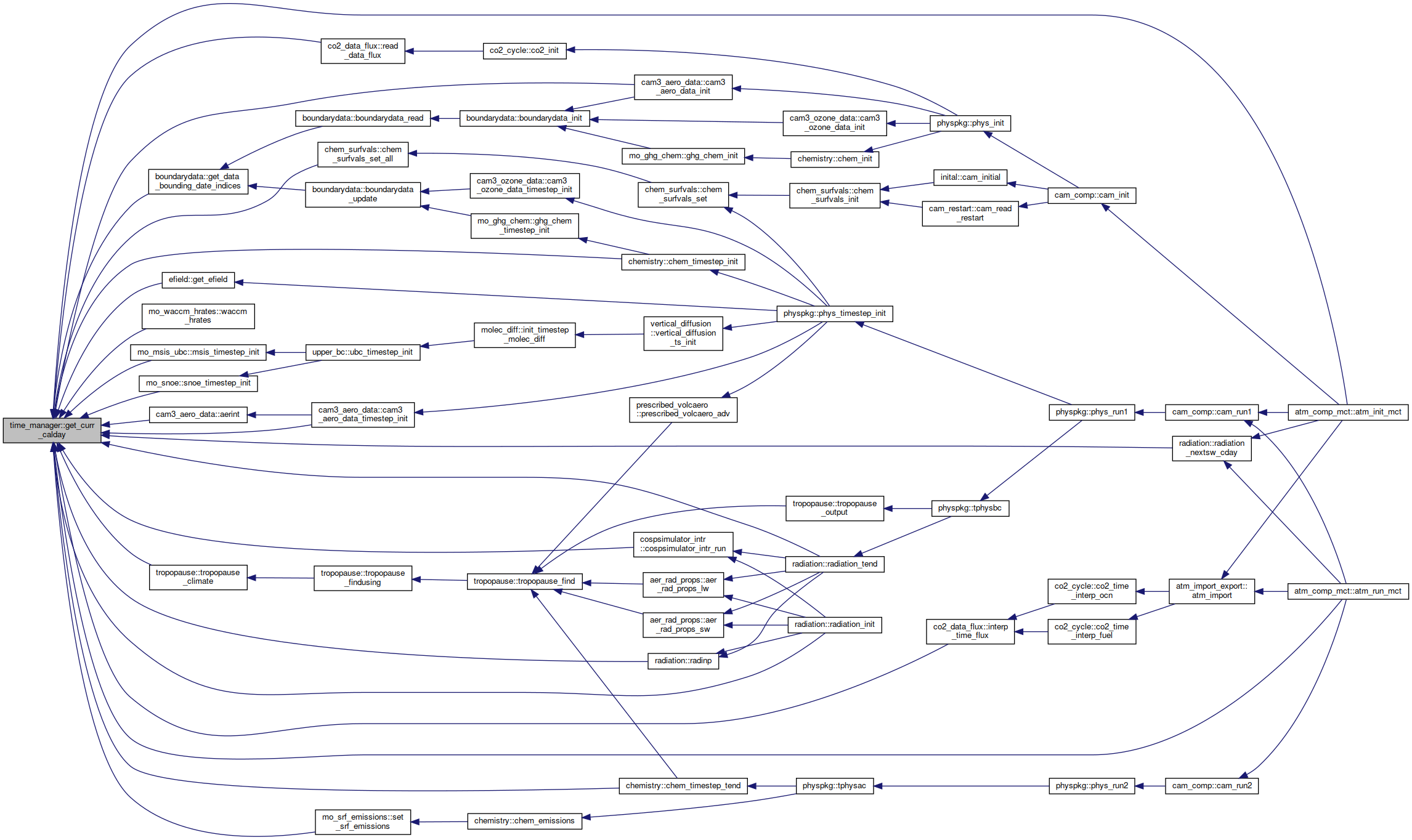
◆ get_curr_date()
| subroutine, public time_manager::get_curr_date | ( | integer, intent(out) | yr, |
| integer, intent(out) | mon, | ||
| integer, intent(out) | day, | ||
| integer, intent(out) | tod, | ||
| integer, intent(in), optional | offset | ||
| ) |
Here is the call graph for this function:

Here is the caller graph for this function:
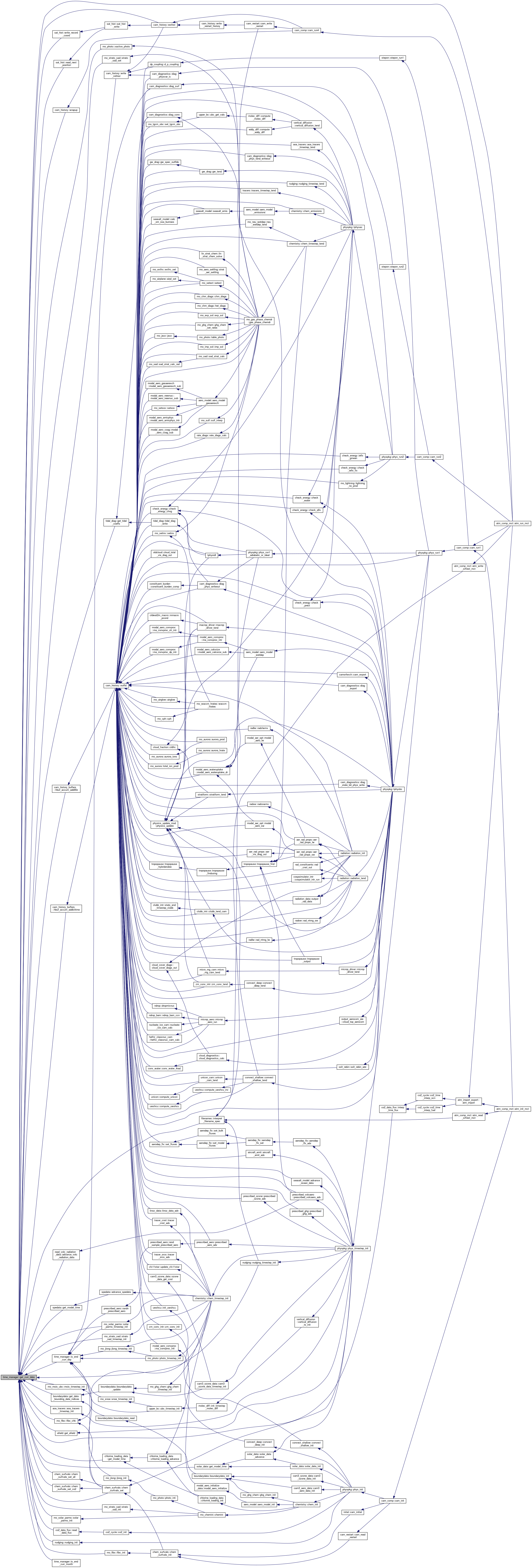
◆ get_curr_time()
| subroutine, public time_manager::get_curr_time | ( | integer, intent(out) | days, |
| integer, intent(out) | seconds | ||
| ) |
Here is the call graph for this function:

Here is the caller graph for this function:

◆ get_nstep()
| integer function, public time_manager::get_nstep | ( | ) |
Here is the call graph for this function:

Here is the caller graph for this function:
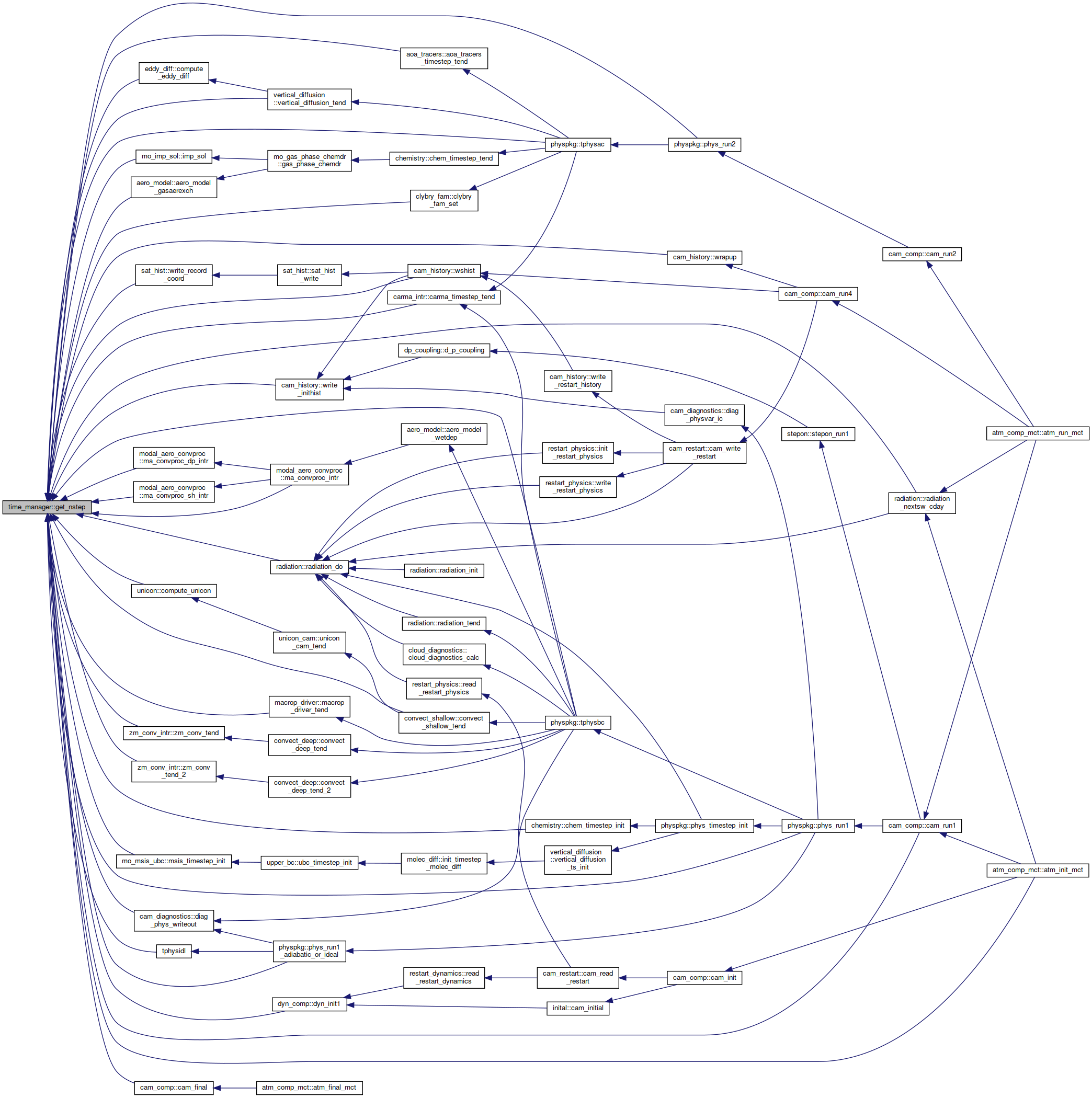
◆ get_perp_date()
| subroutine, public time_manager::get_perp_date | ( | integer, intent(out) | yr, |
| integer, intent(out) | mon, | ||
| integer, intent(out) | day, | ||
| integer, intent(out) | tod, | ||
| integer, intent(in), optional | offset | ||
| ) |
Here is the call graph for this function:

Here is the caller graph for this function:

◆ get_prev_date()
| subroutine, public time_manager::get_prev_date | ( | integer, intent(out) | yr, |
| integer, intent(out) | mon, | ||
| integer, intent(out) | day, | ||
| integer, intent(out) | tod | ||
| ) |
Here is the call graph for this function:

Here is the caller graph for this function:

◆ get_prev_time()
| subroutine, public time_manager::get_prev_time | ( | integer, intent(out) | days, |
| integer, intent(out) | seconds | ||
| ) |
Here is the call graph for this function:

Here is the caller graph for this function:

◆ get_ref_date()
| subroutine, public time_manager::get_ref_date | ( | integer, intent(out) | yr, |
| integer, intent(out) | mon, | ||
| integer, intent(out) | day, | ||
| integer, intent(out) | tod | ||
| ) |
Here is the call graph for this function:

Here is the caller graph for this function:

◆ get_start_date()
| subroutine, public time_manager::get_start_date | ( | integer, intent(out) | yr, |
| integer, intent(out) | mon, | ||
| integer, intent(out) | day, | ||
| integer, intent(out) | tod | ||
| ) |
Here is the call graph for this function:

Here is the caller graph for this function:

◆ get_step_size()
| integer function, public time_manager::get_step_size | ( | ) |
Here is the call graph for this function:

Here is the caller graph for this function:
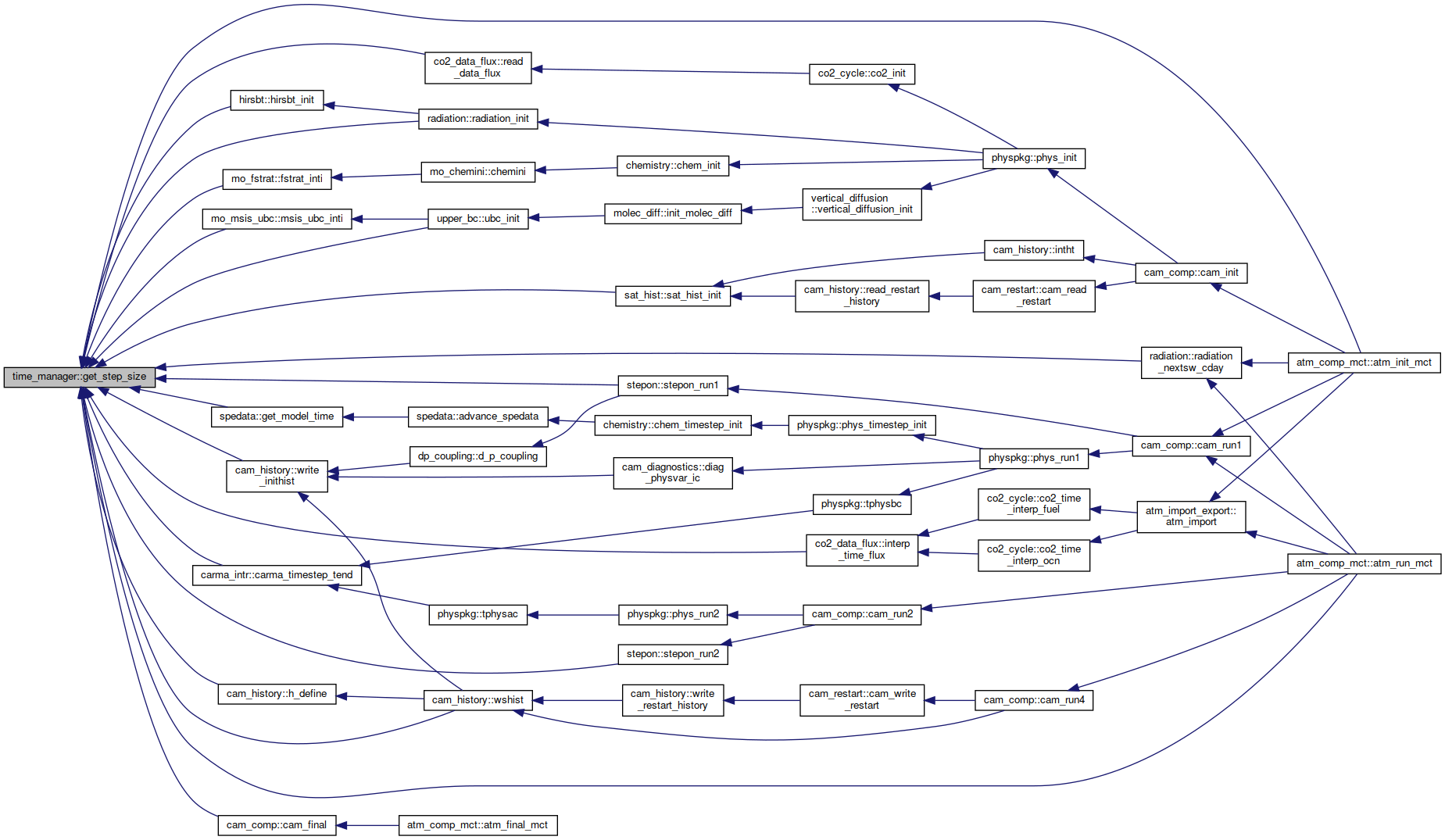
◆ init_calendar()
|
private |
Here is the call graph for this function:

Here is the caller graph for this function:

◆ initialize_clock()
|
private |
Here is the call graph for this function:

Here is the caller graph for this function:

◆ is_end_curr_day()
| logical function, public time_manager::is_end_curr_day | ( | ) |
Here is the call graph for this function:

Here is the caller graph for this function:

◆ is_end_curr_month()
| logical function, public time_manager::is_end_curr_month | ( | ) |
Here is the call graph for this function:

◆ is_first_restart_step()
| logical function, public time_manager::is_first_restart_step | ( | ) |
Here is the caller graph for this function:

◆ is_first_step()
| logical function, public time_manager::is_first_step | ( | ) |
Here is the call graph for this function:

Here is the caller graph for this function:
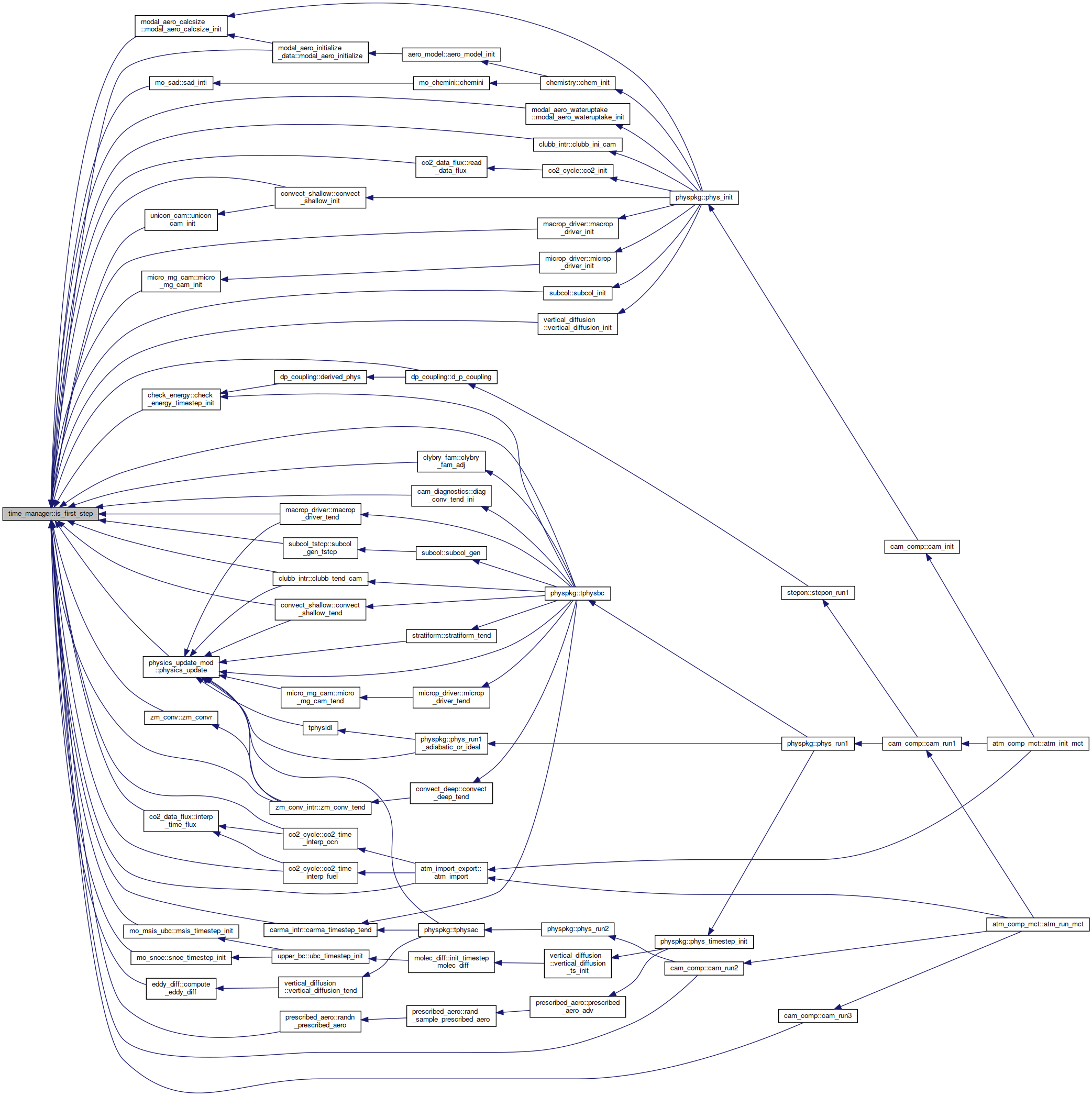
◆ is_last_step()
| logical function, public time_manager::is_last_step | ( | ) |
Here is the call graph for this function:

Here is the caller graph for this function:

◆ is_perpetual()
| logical function, public time_manager::is_perpetual | ( | ) |
Here is the caller graph for this function:

◆ set_date_from_time_float()
| subroutine, public time_manager::set_date_from_time_float | ( | real(r8), intent(in) | time, |
| integer, intent(out) | year, | ||
| integer, intent(out) | month, | ||
| integer, intent(out) | day, | ||
| integer, intent(out) | sec | ||
| ) |
Here is the call graph for this function:

Here is the caller graph for this function:
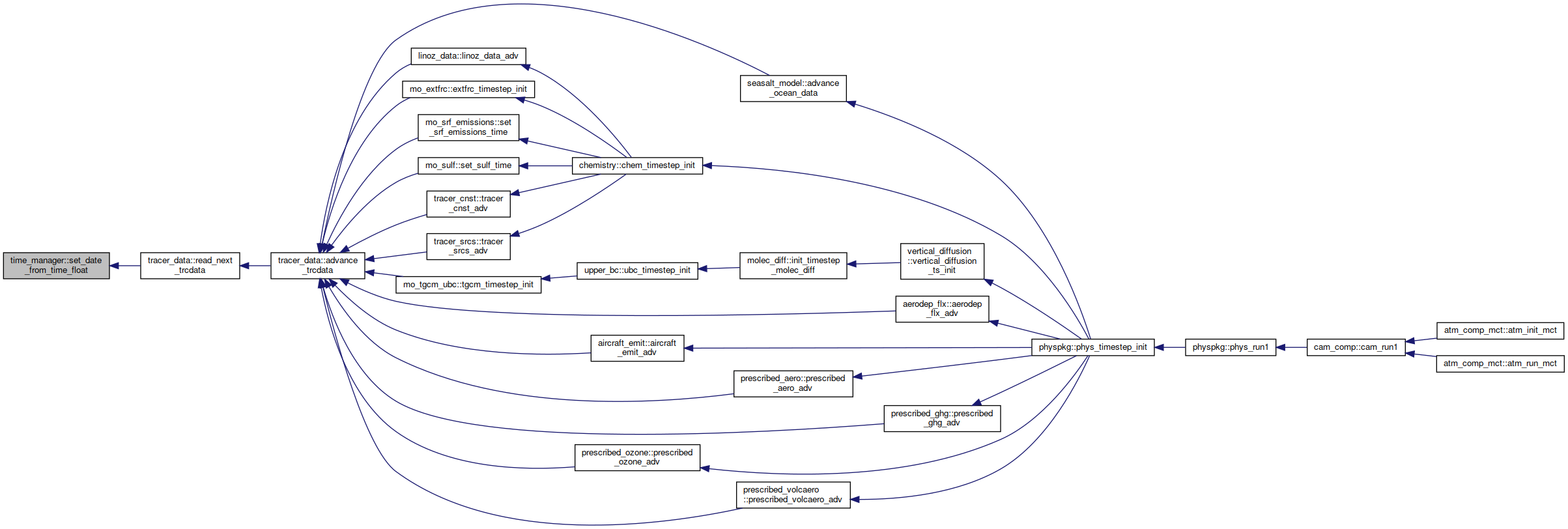
◆ set_time_float_from_date()
| subroutine, public time_manager::set_time_float_from_date | ( | real(r8), intent(out) | time, |
| integer, intent(in) | year, | ||
| integer, intent(in) | month, | ||
| integer, intent(in) | day, | ||
| integer, intent(in) | sec | ||
| ) |
Here is the call graph for this function:

Here is the caller graph for this function:
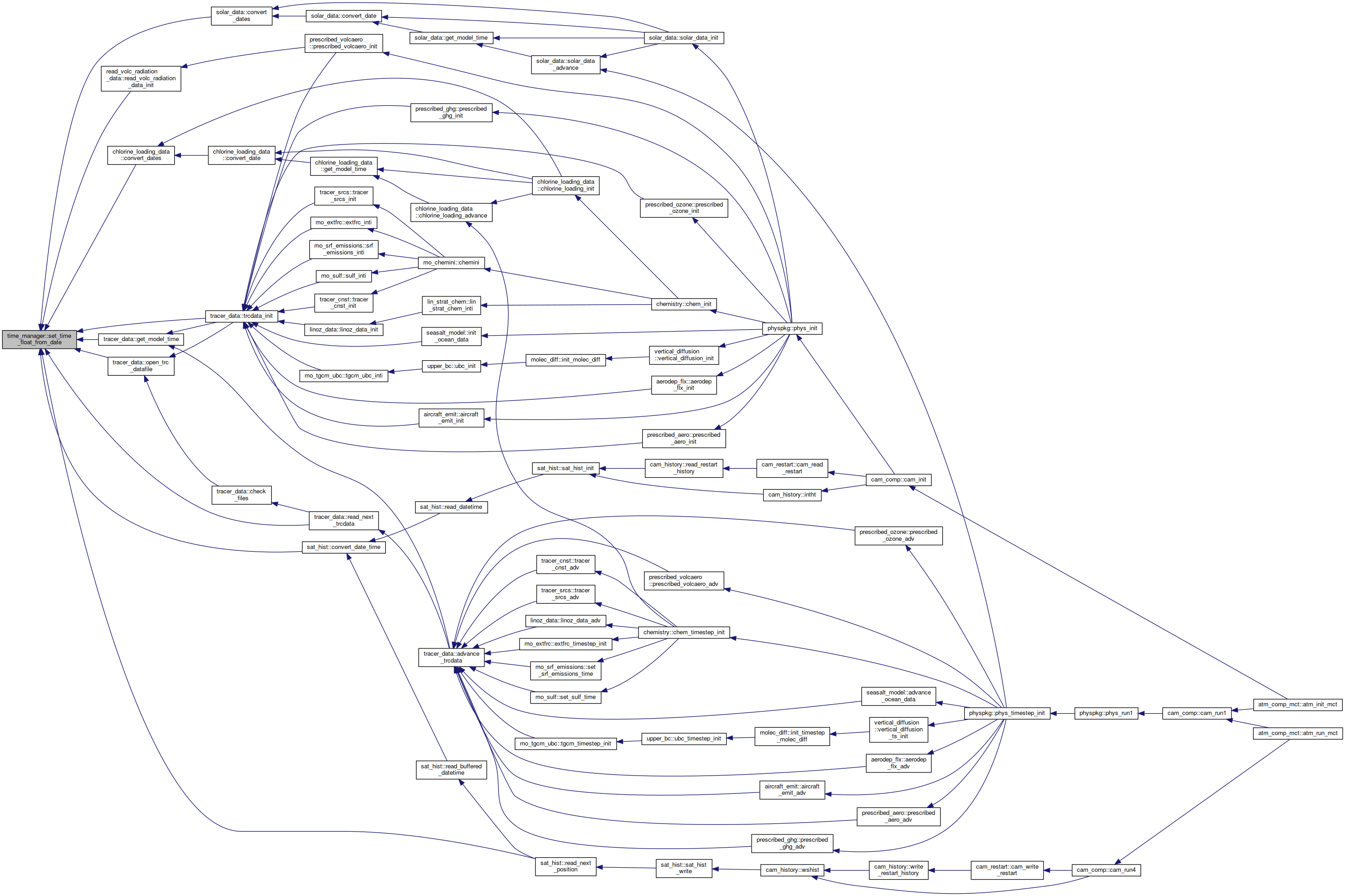
◆ timegetymd()
|
private |
Here is the call graph for this function:

Here is the caller graph for this function:

◆ timemgr_check_restart()
| subroutine, public time_manager::timemgr_check_restart | ( | character(len=*), intent(in) | calendar_in, |
| integer, intent(in) | start_ymd, | ||
| integer, intent(in) | start_tod, | ||
| integer, intent(in) | ref_ymd, | ||
| integer, intent(in) | ref_tod, | ||
| integer, intent(in) | dtime_in, | ||
| logical, intent(in) | perpetual_run, | ||
| integer, intent(in) | perpetual_ymd | ||
| ) |
Here is the caller graph for this function:

◆ timemgr_datediff()
| subroutine, public time_manager::timemgr_datediff | ( | integer, intent(in) | ymd1, |
| integer, intent(in) | tod1, | ||
| integer, intent(in) | ymd2, | ||
| integer, intent(in) | tod2, | ||
| real(r8) | days | ||
| ) |
Here is the call graph for this function:

Here is the caller graph for this function:

◆ timemgr_get_calendar_cf()
| character(len=shr_kind_cs) function, public time_manager::timemgr_get_calendar_cf | ( | ) |
Here is the call graph for this function:

Here is the caller graph for this function:

◆ timemgr_init()
| subroutine, public time_manager::timemgr_init | ( | character(len=*), intent(in) | calendar_in, |
| integer, intent(in) | start_ymd, | ||
| integer, intent(in) | start_tod, | ||
| integer, intent(in) | ref_ymd, | ||
| integer, intent(in) | ref_tod, | ||
| integer, intent(in) | stop_ymd, | ||
| integer, intent(in) | stop_tod, | ||
| logical, intent(in) | perpetual_run, | ||
| integer, intent(in) | perpetual_ymd | ||
| ) |
Here is the call graph for this function:
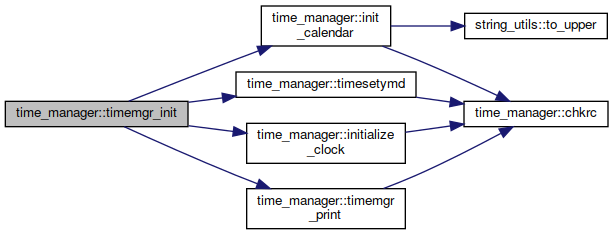
Here is the caller graph for this function:

◆ timemgr_init_restart()
| subroutine, public time_manager::timemgr_init_restart | ( | type(file_desc_t) | File | ) |
Here is the call graph for this function:

Here is the caller graph for this function:

◆ timemgr_is_caltype()
| logical function, public time_manager::timemgr_is_caltype | ( | character(len=*), intent(in) | cal_in | ) |
Here is the call graph for this function:

Here is the caller graph for this function:
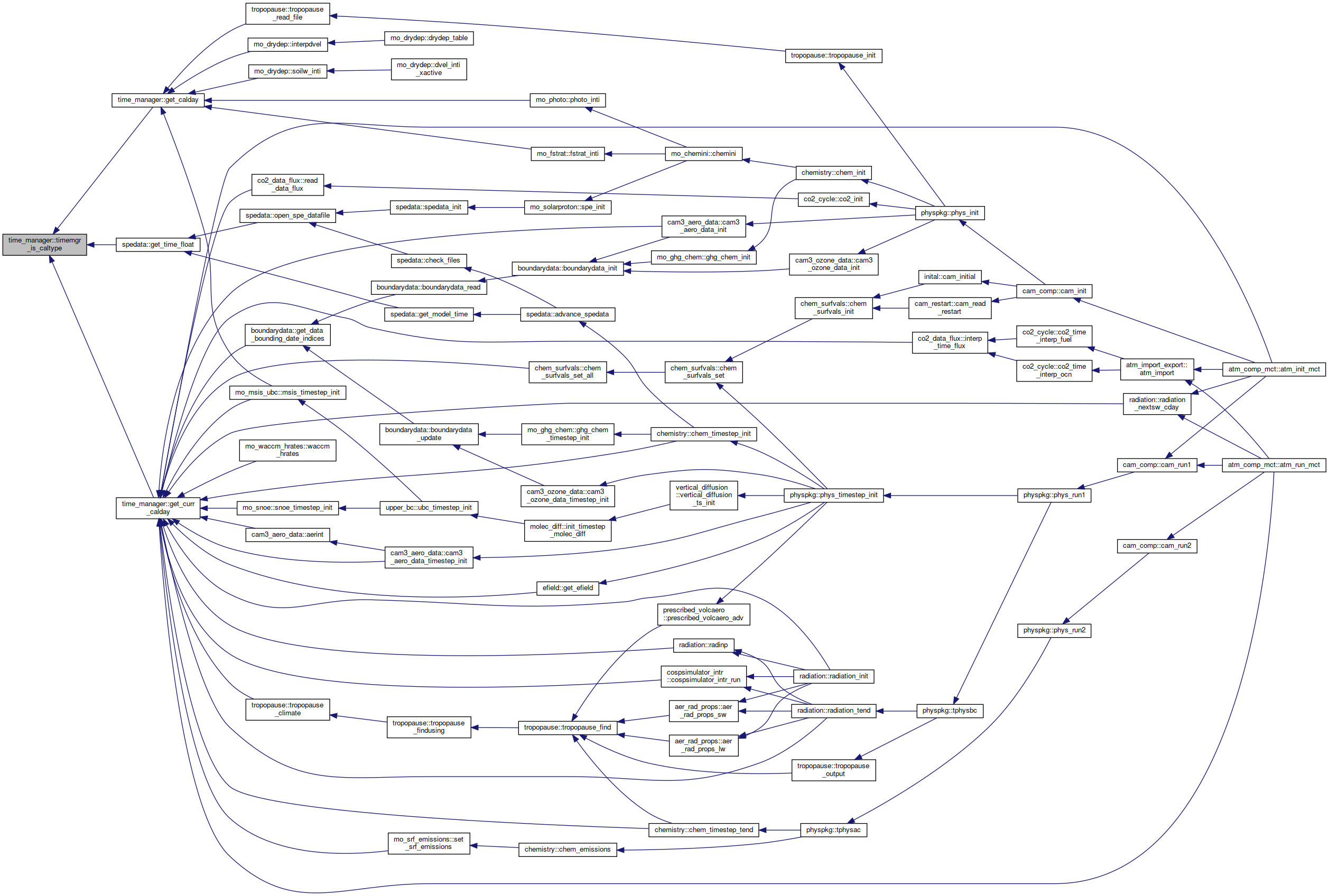
◆ timemgr_print()
|
private |
Here is the call graph for this function:

Here is the caller graph for this function:

◆ timemgr_read_restart()
| subroutine, public time_manager::timemgr_read_restart | ( | type(file_desc_t) | File | ) |
Here is the call graph for this function:

Here is the caller graph for this function:

◆ timemgr_restart()
| subroutine, public time_manager::timemgr_restart | ( | integer, intent(in) | stop_ymd, |
| integer, intent(in) | stop_tod | ||
| ) |
Here is the call graph for this function:
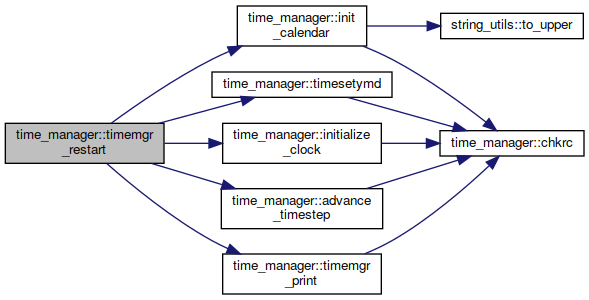
Here is the caller graph for this function:

◆ timemgr_set_date_time()
| subroutine, public time_manager::timemgr_set_date_time | ( | integer, intent(in) | new_ymd, |
| integer, intent(in) | new_tod | ||
| ) |
Here is the call graph for this function:

◆ timemgr_time_ge()
| subroutine, public time_manager::timemgr_time_ge | ( | integer, intent(in) | ymd1, |
| integer, intent(in) | tod1, | ||
| integer, intent(in) | ymd2, | ||
| integer, intent(in) | tod2, | ||
| logical | time2_ge_time1 | ||
| ) |
Here is the call graph for this function:

Here is the caller graph for this function:

◆ timemgr_time_inc()
| subroutine, public time_manager::timemgr_time_inc | ( | integer, intent(in) | ymd1, |
| integer, intent(in) | tod1, | ||
| integer, intent(out) | ymd2, | ||
| integer, intent(out) | tod2, | ||
| integer, intent(in), optional | inc_s, | ||
| integer, intent(in), optional | inc_h, | ||
| integer, intent(in), optional | inc_d | ||
| ) |
Here is the call graph for this function:

Here is the caller graph for this function:

◆ timemgr_write_restart()
| subroutine, public time_manager::timemgr_write_restart | ( | type(file_desc_t) | File | ) |
Here is the call graph for this function:

Here is the caller graph for this function:

◆ timesetymd()
|
private |
Here is the call graph for this function:

Here is the caller graph for this function:
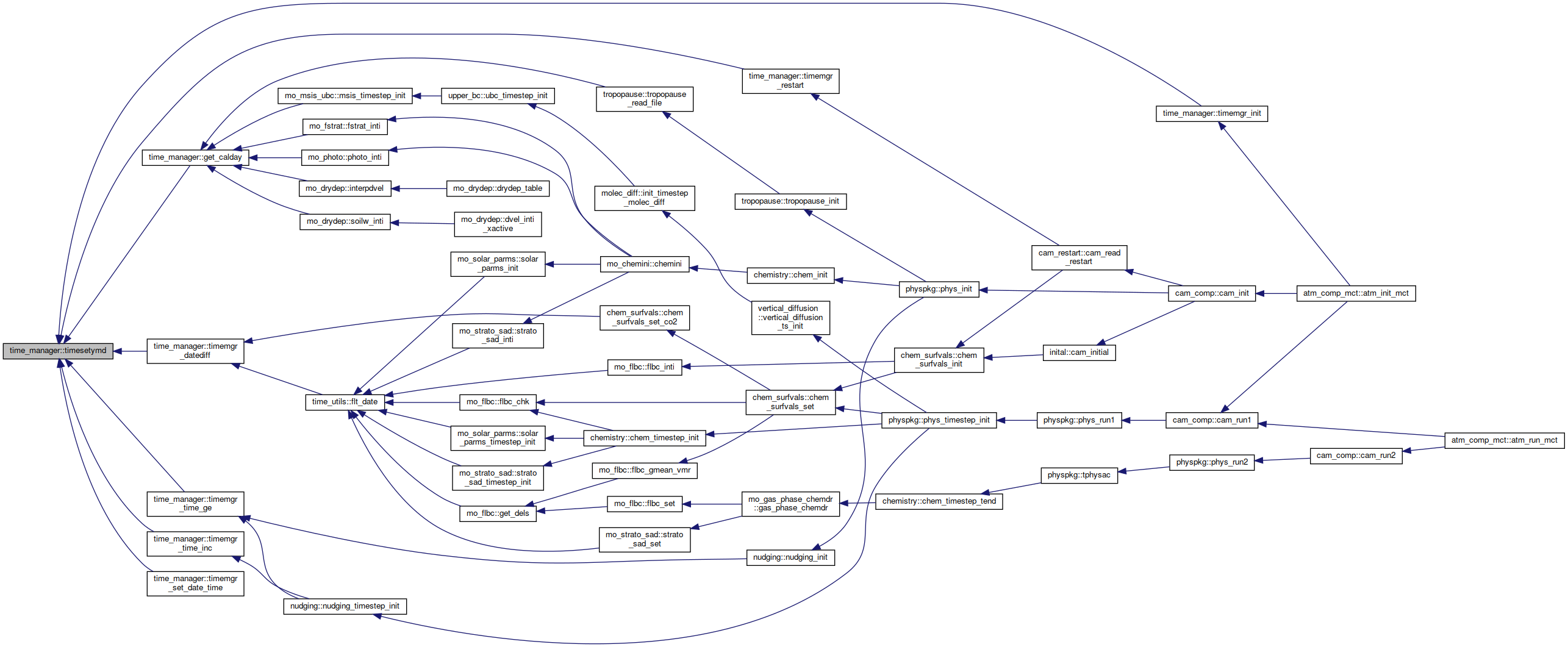
◆ timevars_set_names()
|
private |
Here is the caller graph for this function:

Variable Documentation
◆ cal_type
|
private |
◆ calendar
|
private |
◆ dtime
| integer, public time_manager::dtime = uninit_int |
◆ rst_calendar
|
private |
◆ rst_curr_tod
|
private |
◆ rst_curr_ymd
|
private |
◆ rst_nstep
|
private |
◆ rst_perp_cal
|
private |
◆ rst_perp_ymd
|
private |
◆ rst_ref_tod
|
private |
◆ rst_ref_ymd
|
private |
◆ rst_start_tod
|
private |
◆ rst_start_ymd
|
private |
◆ rst_step_days
|
private |
◆ rst_step_sec
|
private |
◆ rst_stop_tod
|
private |
◆ rst_stop_ymd
|
private |
◆ timevars
◆ tm_cal
|
private |
◆ tm_clock
|
private |
◆ tm_first_restart_step
|
private |
◆ tm_perp_calendar
|
private |
◆ tm_perp_date
|
private |
◆ uninit_int
|
private |
◆ varcnt
|
private |
